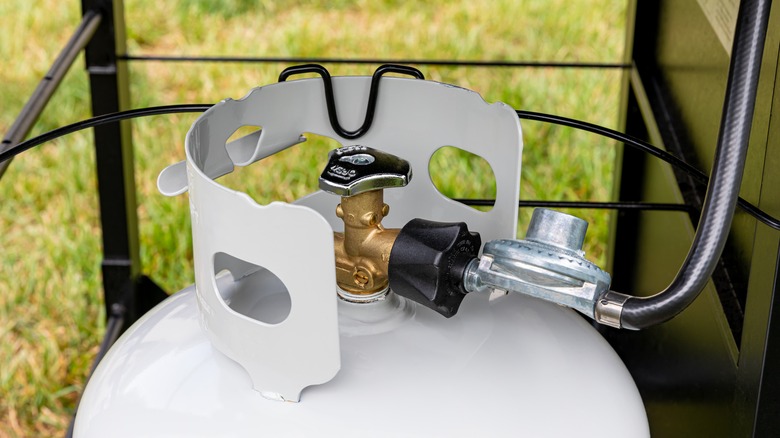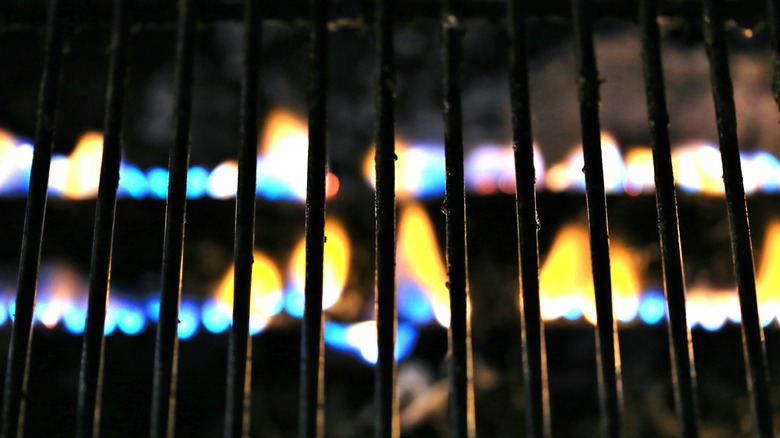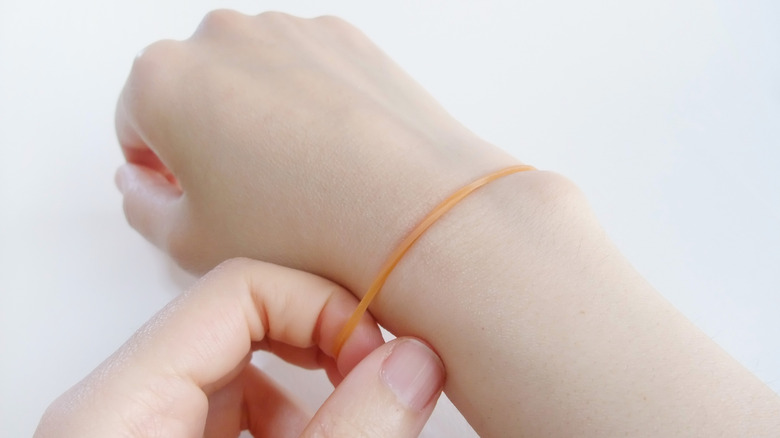This Clever Rubber Band Trick Will Remind You To Turn Off Your Grill's Gas
Propane tanks should never be left on after running a gas grill. It's all too easy for someone to accidentally turn a knob on the grill and cause gas to spill out, which can fill the inside of an enclosed space and create a gas bomb. If you find you have a hard time remembering to turn the tank off after barbecuing, all you need to remind yourself is a clever rubber band trick from the minds at Cooks Illustrated: Simply wrap a rubber band around the valve handle of the propane tank. When the gas is on, take the rubber band off and wear it on your wrist. After the cooking is done, close the gas valve, take the rubber band off, and put it back on the valve.
Warm weather and grilling go hand in hand. And while there are some die-hards who believe that grilling season is year-round, for the rest of us, the grill only gets used for a few months — like on July 4th, which has included barbecues since the very beginning of our country's history. Because it's not an appliance we use all the time, it's easy to forget important safety routines like turning off the propane tank when you're done cooking. If you keep the gas locked down, you can easily get eight to 10 grill sessions in before you have to replace the tank, and you can rest easy knowing that there's no gas leaking on your back porch or patio.
Gas grills versus kitchen stoves
When it's time to get your grill ready for summer, proper safety protocol for the season should be top of mind. A lot of people skip turning off the propane after grilling, thinking that grills are just as safe as a regular kitchen stove because they're based on similar technology, but there are definitely some distinct differences.
Kitchen stoves that use propane gas have more safety measures in place to prevent leaks, the most important of which is the starter mechanism. Indoor stoves have either automatic pilotless ignition systems that are connected to electricity so they always light, or pilot lights. This way, when a knob is turned on the gas is more likely to light and there won't be any leaking gas. They're not entirely foolproof, however, which is why gas stoves may become a thing of the past.
Gas grills, on the other hand, have electric starters that are connected to a low-voltage battery. When the battery runs out, the starter doesn't work. Additionally, grills live outside where they're exposed to humidity and moisture, which can degrade the delicate sparking mechanism of the starter. If you've ever struggled to light your gas grill after it's been around for a few seasons, you know that gas grill starters can burn out pretty quickly. If a knob is accidentally turned just a little bit, and the starter isn't working, you'll have a gas leak on your hands.
A rubber band is an easy reminder
It's also not uncommon for animals to chew on the gas line between your grill and the tank, especially during times when the grill isn't used very much, which can cause a dangerous gas leak. In this scenario, as long as the shutoff valve is closed, the propane is safely contained inside the tank. If the grill has been sitting for a while over the winter in the garage or basement, make sure to check the gas line before hooking everything up for the season, and replace any parts that look rusty, corroded... or chewed.
Propane tanks should always be stored outside in a well-ventilated place, even if you put your grill away in the basement or the garage for the winter. If the handle of the tank isn't closed tightly enough, propane can leak causing a fire — or even an explosion — hazard. During grilling season, as long as you have that rubber band around your wrist, however, you'll have a visual reminder that your work as the grill master isn't finished. Take a second to turn off the gas valve, and remember: "Lefty loosey, righty tighty."


